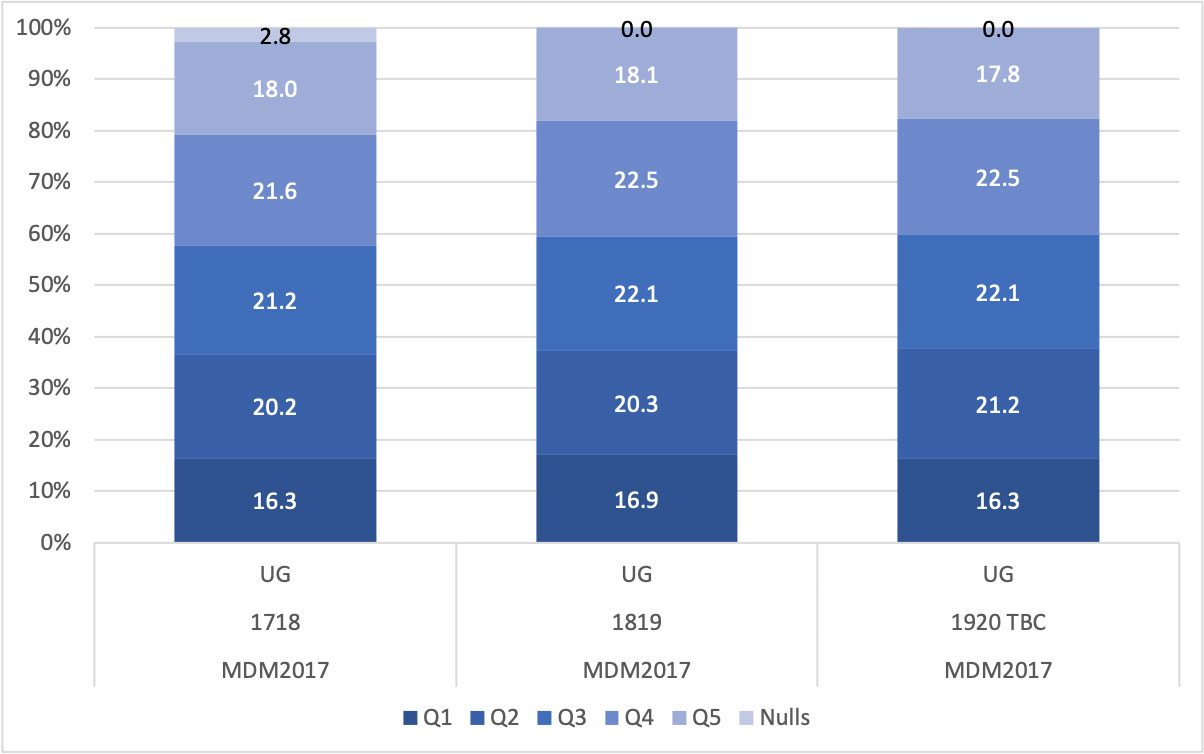Widening Access and Participation Plan 2021/22
Background
Ulster University is welcoming and inclusive with a reputation for widening access to higher education and increasing social mobility. As a civic university we are committed to providing learning opportunities for everyone with the ability to benefit from them, and we excel in participation by those in society who are under-represented in universities generally.
One of the means by which the University assures that it is widening access and participation is through its annual Widening Access and Participation Plan. The contents of this plan are audited by government to ensure that reinvestment of a proportion of the additional tuition fee paid by students is administered wisely, effectively and in accordance with the Higher Education (Northern Ireland) Order 2005.
Download the University’s Widening Access and Participation Plan for 2021/22
The diagram below illustrates the University’s long-standing success in attracting students from the full range of socioeconomic backgrounds.

Maintaining Widening Access and Participation
To maintain our success in widening access and to improve participation by enrolment further, the University, through the Widening Access and Participation Plan, has identified the following priorities:
- Maintaining our reach and impact on under-represented groups
- Aligning resources to targeted interventions and our targets
- Improving conversion from our outreach to enrolments for hard-to-reach learners
- Maintaining Ulster's Access Bursary
- Maintaining direct expenditure across outreach to schools and communities and direct financial support to students at levels greater than the statutory minimum
Planned Expenditure for Outreach and Financial Support
| Activity | Actual spend | Estimated spend |
|---|---|---|
Bursaries | £1.67m | £1.88m |
Other Financial Support | £0.02m | £0.08m |
Retention and Success | £0.30m | £0.58m |
Research and Analytics | £0.11m | £0.20m |
Outreach | £0.94m | £0.93m |
Bursaries
Ulster's Access Bursaries are available to NI-domiciled students who pay the full rate tuition fee and who have a household income of less than £19,203. Each eligible student will receive bursary equivalent to 10% of the tuition fee.
In addition, a £1,000 bursary is available to students from a background of care. This may be paid in addition to Ulster's Access Bursary.
Get more Information on how and when to apply for these bursaries
Outside these main bursaries of the Widening Access and Participation Plan, a substantial number and level of special funds are administered for eligible students. Further details can be found at:
Other Direct Financial Support
Fee waivers are available for eligible participants in modular flexible learning within the Certificate of Personal and Professional Development. This provides new opportunities for individuals and organisations to develop tasters and a flexible pathway to higher education for young people and adults not in education, employment or training.
Retention and Success
The University has put in place a number of interventions to support students across the University at risk of non-progression. These include:
- Peer-Assisted Study Sessions, PASS - a supported WP mentoring scheme;
- Technologies that support academic writing skills, learning analytics and attendance monitoring in support of WP engagement and success;
- Technology Fund to support most disadvantaged students;
- Studiosity Student Connect Peer Mentoring Service.
Research and Analytics
Research within the Widening Access and Participation Unit is focused on two discrete areas:
- Research and Analytics – the main objectives of this are to create dashboards to ensure that resources are directed to where they have most impact and to identify and disseminate good practice;
- An action research project on Taking Boys’ Seriously which looks specifically at the underachievement of males.
Outreach
This entails an extensive schools and community programme of educational aspiration and attainment raising, including: lectures, laboratory activities, mentored projects, interactive workshops, summer schemes, large-scale events and competitions, school visits and validated voluntary tutoring roles in schools. These are designed for primary, post-primary, and special needs schools, their teachers, pupils and parents in some cases.
